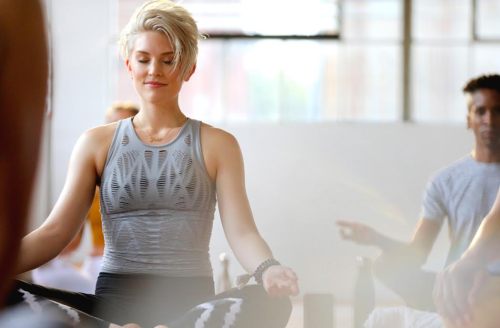advertisement
On the fence about taking up yoga? These 3 mental health benefits might change your mind
Studies show that there are some pretty major mental health benefits of yoga, so we had a pro break down her top three benefits.

If you’re a yoga skeptic, you’ve likely entertained the belief that yoga is “just for flexible people” or “not a real workout.” And we get it—when you see videos of people twisting themselves into pretzel-like shapes and making it look easy, it’s pretty clear where those misconceptions come from.
But as more and more (and more!) studies have explored the benefits of yoga, a trend has emerged from the findings: Practicing yoga has some pretty major mental health benefits (that go beyond just mentally high-fiving yourself when you finally nail crow pose).
“Yoga is a wonderful physical workout using your bodyweight to train, […] but as we have seen it’s also a mental workout,” says Heather Peterson, chief yoga officer at CorePower Yoga. “This multifaceted approach to health is what makes yoga an incredible physical-mental practice.”
If you’re still dubious about stepping onto the mat, consider this: Research by Shawn Achor out of Harvard University and additional studies have linked mental wellbeing and your physical health together.
“What neurologists and physicians are finding out is that our body and mind are not as separate as was thought,” Peterson says. “Addressing your mental health practices in conjunction with your physical health practices is the way to raise your baseline of wellbeing.” Now are you ready to get flowing?
Keep reading for 3 mental health benefits of yoga that will make you want to roll out your mat right now.
Benefit 1: Learning to breathe before reacting
This benefit might not feel so surprising (how many times have you been told to take a deep breath to calm down?), but there’s legit evidence that breath techniques can give your mental health a boost.
Studies support that yoga can help train your nervous system to better adapt to stress, which has all sorts of IRL applications. “In my 20-plus years of practicing yoga, I’ve found that yogic breathing has calmed my mind in the most stressful of times,” Peterson says. “Even if I only have time for a 20-minute practice, I find that I can think clearly and feel rejuvenated from the rhythmic breathing techniques.”
So next time you find yourself in a stressful situation, take that aforementioned advice and take a deep breath. “This pause allows your prefrontal cortex to come online,” Peterson explains. “If we react quickly, just the survival parts of our brain are engaged, and we come from that perspective. The pause allows our higher cognitive function to help us make holistic decisions.”

Benefit 2: Using intention-setting to boost your Zen
Another common complaint from people who aren’t big yoga fans is that they don’t like being alone with their thoughts for a full 60-minute class. But working through that discomfort is exactly how you unlock more of yoga’s mental-health benefits, and science agrees: Studies have shown that mindfulness meditation can have a beneficial effect on reducing anxiety and improving reactions to stress.
“At CorePower Yoga we start every class by setting an intention,” Peterson says of how the studio integrates mindfulness into each class. “This reminds you that your mindset is in your control, and that while we are committed to the intention, we are not attached as the teacher guides us through the flow. Commitment versus attachment promotes health, accountability, and freedom.”
This more relaxed way of approaching intentions can be practically applied to areas of your life outside the studio (like when you intend to meal prep and do laundry on Sunday, but end up only doing one), and help you keep your cool when life doesn’t go as planned. Because TBH how often does that happen?
Benefit 3: Yes, yoga really is a workout
You know those endorphins you credit for your runner’s high or post-workout good mood? You can score them through yoga too, especially if it’s a sweaty, strength-building sesh, like at CorePower.
“I know that in times when I haven’t exercised consistently, like in college, I was more likely to get the ‘blues’ and feel lethargic,” Peterson says. “Through the year, I realized that a cross-training regimen with yoga, cardio, and strength training works great for me, and I get all of that with CorePower Yoga in our C2 classes and Yoga Sculpt Classes.”
Studies have shown that exercise can improve mood and help with depression, and it’s even more beneficial when the workout is a rhythmic, aerobic exercise of moderate to low intensity. Sounds a lot like yoga, don’t you think?
Ready to try it for yourself? Click here to score a free week of yoga at any CorePower Yoga location.
Sponsored by CorePower Yoga
Top photo: Getty Images/PeopleImages
Sign Up for Our Daily Newsletter
Get all the latest in wellness, trends, food, fitness, beauty, and more delivered right to your inbox.
Got it, you've been added to our email list.




